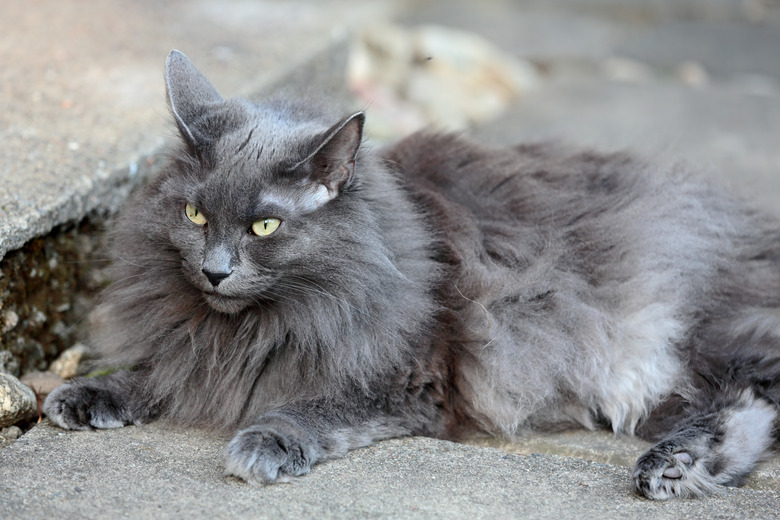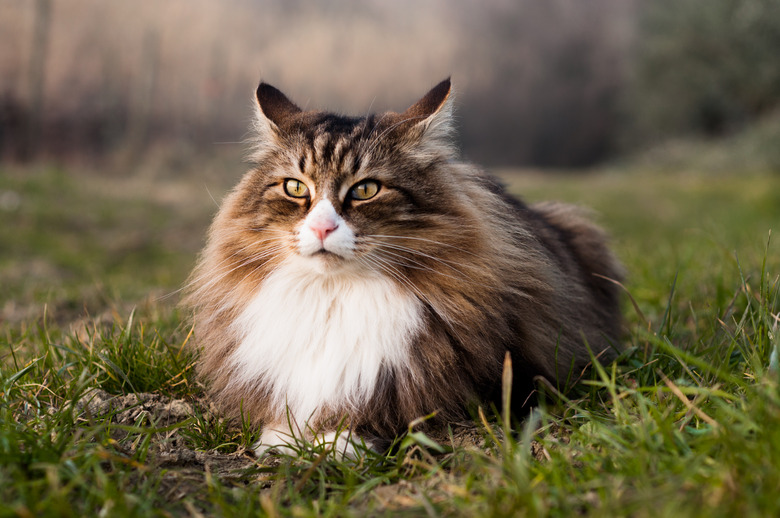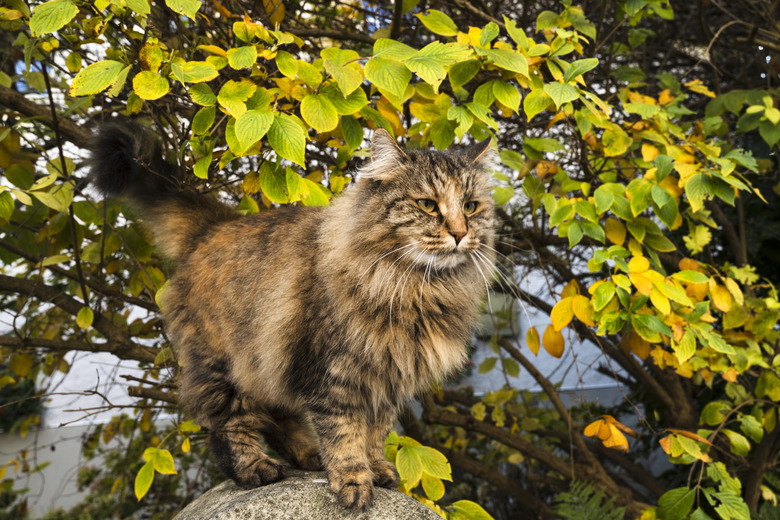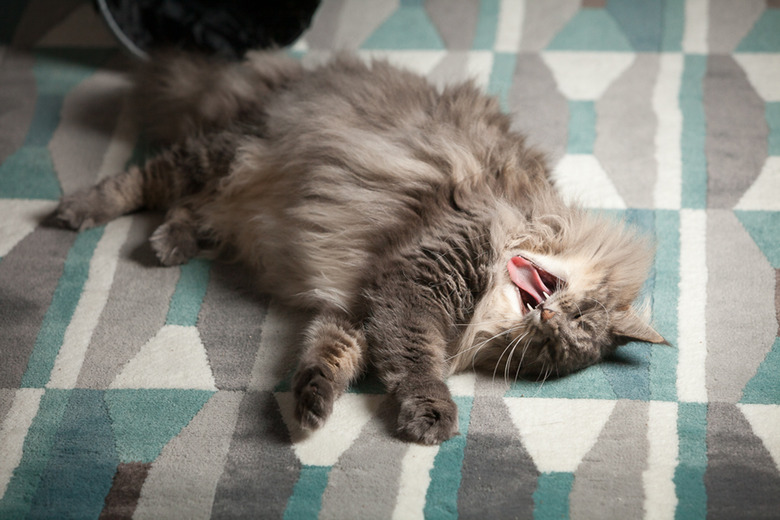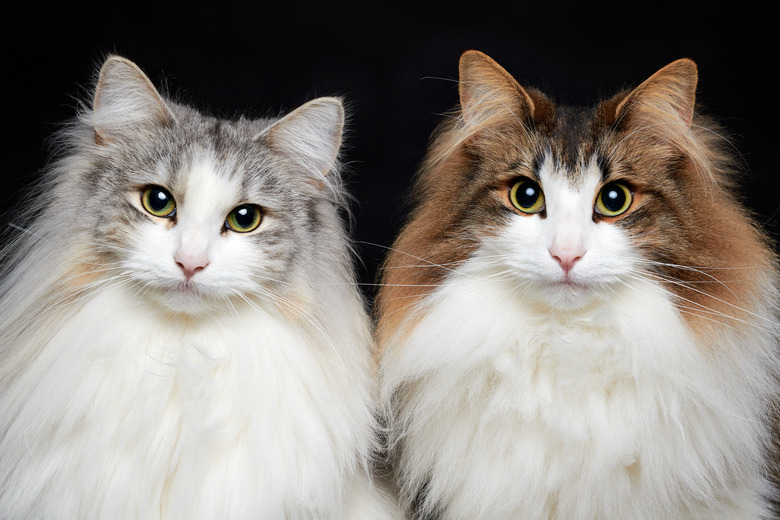Norwegian Forest Cat Breed Information, Personality & Care
Norwegian forest cat quick facts
Length: 12 – 18 inches
Weight: Females: 8 – 12 pounds, males: 12 – 18 pounds
Lifespan: 14 – 16 years
Coat length: Long
Coloring: Most coat colors and patterns except for colorpoint colors
Grooming needs: Low
Friendliness: Breed alone is not an accurate predictor of individual cats' personalities. However, Norwegian forest cats are generally regarded as intelligent, friendly, and affectionate.
The Norwegian forest cat, affectionately nicknamed "wegie," is an ancient breed with an affectionate and independent personality. They are large, longhaired cats that are built to survive in the wilds of Norway. Carefully consider the breed's personality and care requirements to decide whether a wegie may make a wonderful addition to your family.
Norwegian forest cat history
Norwegian forest cat history
As the name suggests, the breed is native to Norway and the cats are believed to have traveled on ships with the Norse Vikings where they would keep the rodent populations under control. This is likely how they moved from Scandinavian countries to other locations around the world.
In the early 20th century, the breed was becoming incredibly rare and the start of World War II interrupted the implementation and plans to save the breed. Fortunately, the breed survived the war, and breeding programs were started. The cats were imported to the United States for breeding in 1979.
In 1984, the International Cat Association (TICA) granted championship status and then the Cat Fanciers Association (CFA) granted championship status in 1993.
Here are some fun facts about the breed:
- The Norwegian forest cat is the official cat of Norway.
- The breed is depicted in Norwegian folk tales where they are referred to as troll cats or hulderkatt.
- Fairy tales say that six of these cats pulled the chariot for the Norse goddess Freya.
At first glance, it is easy to confuse a Norwegian forest cat, also called Norsk skogkatt, with a Maine coon cat, but there are differences in the appearance of these breeds. Some physical characteristics of a Norwegian forest cat include:
- Water-resistant double coat with a dense undercoat
- Triangular-shaped head
- Almond-shaped eyes
- A full ruff
- Bushy tail
The cats come in nearly any color and pattern including tabby, bicolor, tortoiseshell, and calico. They do not come in colorpoint patterns as you see in Siamese cats.
Norwegian forest cat personality
Norwegian forest cat personality
Norwegian forest cats are intelligent and adapt well to change. They tend to be calm and gentle but will have bursts of play and activity. Their independent nature means that they set the terms for their relationships with their pet parents. They aren't standoffish, though. They are quite affectionate and like to be nearby, if not in your lap, while they nap. They are loyal animals and while they get along with everyone, they are likely to choose a favorite family member.
The cats are also excellent climbers and jumpers. They enjoy high perches, so a tall cat tree and shelves to reach the top of bookcases are a must.
Unlike many other cats, most wegies enjoy the water. This may mean they play in the sink or, if they are allowed outdoors, attempt to catch fish from a pond.
Norwegian forest cat lifespan & health issues
Norwegian forest cat lifespan & health issues
Healthy Norwegian forest cats receiving proper care typically have a lifespan of 14 to 16 years. The breed tends to be quite healthy, but there are some genetic health concerns that affect the breed. These include:
- Hypertrophic cardiomyopathy (HCM): A heart condition that causes the thickening of the heart wall.
- Glycogen storage disease type IV (GSD-IV): A metabolic disease that causes glycogen to build up within the cells
- Pyruvate kinase deficiency (PK-Def): A metabolic disease that can cause the death of red blood cells.
Fortunately, DNA testing is available for both GSD-IV and PK-Def, so be sure to discuss health testing with the breeder and request a copy of the DNA test results. There is no test for HCM, so cats must be examined by a veterinarian and have an echocardiogram to detect the condition.
Norwegian forest cat grooming & care
Norwegian forest cat grooming & care
Norwegian forest cats are quite easy to care for despite their thick, long hair. The breed doesn't shed much throughout the year, but they do molt twice per year. During this time, you may need to groom your cat more frequently.
Brush the cats about once per week to remove any tangles. A comb is usually best to make sure you are combing the fur all the way down to the skin level. Baths are not necessary to maintain a healthy coat, but your water-loving cat may enjoy the experience. If you do bathe your pet, make sure to use a gentle shampoo designed for cats.
Other grooming requirements include:
- Trim the cat's nails
- Clean the cat's ears
- Brush the cat's teeth with a veterinarian-approved toothpaste
Feed your wegie a high-quality, commercial cat food as recommended by your veterinarian, and make sure your cat has access to clean water at all times. Take your cat in for regular veterinary check-ups and make sure they receive any recommended vaccinations.
Welcoming a new cat
Welcoming a new cat
Before you bring your new Norwegian forest kitten or cat into your home, be sure to take some time to cat-proof the house. While a kitten may not be able to climb very high, they will quickly grow up, so don't forget to check high shelves for things like toxic plants and small, fragile items that a jumping cat may damage.
Set up a safe room in your home to welcome your wegie with everything your new cat will need including:
- Food and water
- Litter box
- Cat tree
- Scratching post
- Cat toys
When your new cat arrives, allow them time to explore they room at their own pace. Don't force them to be held and petted. Instead, spend time with your cat, offer to play, and give plenty of positive reinforcement. This will help to develop a trusting relationship. When your cat is comfortable with you and their new environment, you can open the door and let them explore the rest of the house.
Here are some other questions you might have about Norwegian forest cats:
Are Norwegian forest cats rare?
The Norwegian forest cat breed is fairly rare in the United States and it may take some effort to find a reputable breeder with available kittens. You can expect to pay between $900 and $1,500 for a kitten.
Are Norwegian forest cats good pets?
Norwegian forest cats can be excellent pets. While each cat will have their own personality, in general, the breed is both intelligent and sweet. If you are looking for a lap cat, this is not the breed for you. But if you want a sweet, yet independent, companion, you will likely love having a wegie in your home.
